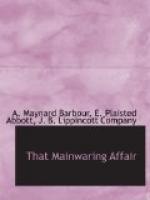Mr. Whitney was warming with his subject, but at this juncture he was peremptorily called to order by Mr. Sutherland, who stated that he objected to counsel making an argument to the jury, when he should confine himself simply to an opening statement. Mr. Whitney’s face flushed as a ripple of amusement ran through the courtroom, but the objection was sustained, and, after a brief summary of what the contestant proposed to show, he resumed his seat, and the court then adjourned until the following morning.
The first testimony introduced on the following day was to establish the unimpeachable honesty and integrity of the deceased Hugh Mainwaring. Both Mr. Elliot and Mr. Chittenden were called to the stand, and their examination — particularly the cross-examination, in which a number of damaging admissions were made — occupied nearly the entire forenoon; the remainder of the day being devoted to the testimony of witnesses from abroad, introduced to show that for years a bitter estrangement had existed between Frederick Mainwaring Scott, the alleged foster-father of the proponent, and the members of the Mainwaring family, — the deceased Hugh Mainwaring and the contestant in particular; and also to show the implacable anger of Ralph Maxwell Mainwaring against his elder son and the extreme improbability of his ever relenting in his favor.
Day after day dragged slowly on, still taken up with the examination of witnesses for contestant; examinations too tedious and monotonous for repetition, but full of interest to the crowds which came and went, increasing daily, till, on the days devoted to the expert testimony, galleries and aisles were packed to overflowing, while throngs of eager listeners gathered in the corridors about the various exits.
It soon became evident that Ralph Mainwaring’s oft repeated assertions concerning the elaborate preparation he had made for the coming contest were no idle boast. Nothing that human ingenuity could devise had been left undone which could help to turn the scale in his own favor. The original will of Ralph Maxwell Mainwaring, by which his elder son was disinherited, was produced and read in court. Both wills were photographed, and numerous copies, minute in every detail, made, in order to show by comparison the differences in their respective signatures. Under powerful microscopes it was discovered that several pauses had been made in the signature of the later will. Electric batteries were introduced to show that the document had been steeped in coffee and tobacco juice to give it the appearance of great age. Interesting chemical experiments were performed, by which a piece of new paper was made to look stained and spotted as if mildewed and musty, while by the use of tiny files and needles, the edges, having first been slightly scalloped, were grated and the paper punctured, till it presented a very similar aspect to the will itself as though worn through at the creases and frayed and tattered with age.




